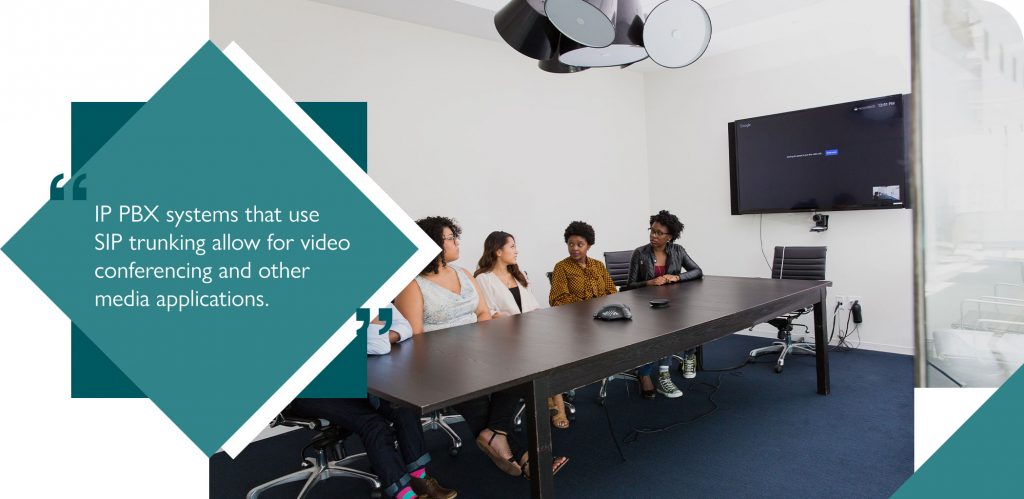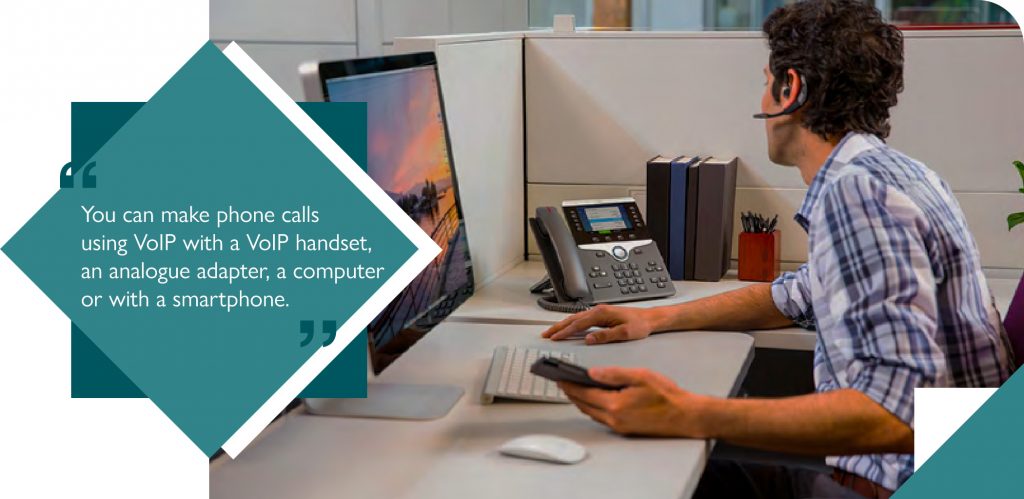VoIP is quickly becoming one of the most popular phone solutions for both business and domestic use. The revolutionary technology uses the internet to make phone calls, providing users with an affordable alternative to landline telephones and hosting a multitude of useful bonus features. But how do VoIP phones work?
What is VoIP?
Voice over Internet Protocol (VoIP) is a phone system that uses the internet to make and receive phone calls, rather than the regular landline network.
Often referred to as internet (IP) telephony or cloud-based telephony, VoIP phones deliver voice calls through your internet connection, usually via dedicated handsets. Although most VoIP phone systems look similar in appearance to landline phones, they work very differently.
How do VoIP phones work?
The VoIP system works by using packet switching technology that converts analogue voice signals into digital data. In simple terms, this means that sound waves (i.e. your voice) are converted into digital data, enabling people to use the Internet as a communication method for phone calls.
A VoIP phone works according to the following steps:
- When a VoIP phone receives the digital data from another device, it splits the data into information packets and puts a destination address on each packet.
- The converted data is then sent over your broadband line to your router.
- Once the router has received the data, it finds the shortest path to its destination. The packet might pass through multiple routers in order to optimize the final route.
- The packet is then received at the destination.
- The receiving VoIP phone then uses the addresses for each packet to put the packets in the correct order.
- The VoIP user then receiver the data as recognisable speech.

Most businesses will use a communication centre to organise the phones within the company’s network. These transmission centres are known as private brand exchange systems (PBX).
A PBX system is a private telephone network uses the local area network to connect to the telephone network, allowing calls to be made and received.
PBX systems have now evolved to allow calls to be made using VoIP technology; this newer system is known as IP PBX. IP PBX systems are call centres suited for IP networks, allowing users to make phone calls through their internet connection.
IP PBX switches calls between VoIP users on local lines, permitting calls to be connected between VoIP users and traditional users, or between two traditional telephone users. This means that users can have one network for both voice and data communications, reducing cost and increasing efficiency. Furthermore, IP PBX systems that use SIP trunking allow for video conferencing, instant messaging, media distribution and other applications.
VoIP phones rely on an off-premises router, but the way calls are made will vary depending on the device you’re using. You can make phone calls using IP telephony either with a VoIP handset, a VoIP adapter, a computer or with a smartphone.

How does VoIP work with different devices?
Analogue Telephone Adapter: The most common way to use VoIP is either with a VoIP handset or using an analogue telephone adaptor (ATA). ATAs allow you to connect a standard phone to the internet, allowing you to use your existing phone with the VoIP system.
The ATA converts analogue signals into digital data for transmission over the internet. You simply plug the lead from your telephone that would normally go into the wall socket into the ATA and then you’re ready to make VoIP calls.
VoIP handset: The concept is very similar for regular VoIP handsets. VoIP handsets plug straight into your router using an ethernet cable, allowing calls to be made and received using the internet. VoIP handsets are already set up with all the hardware and software necessary to make the phone work.
Smartphones: You can use most smartphones to make calls over the internet or in conjunction with your VoIP system. There are various apps which allow you to configure your mobile phone to the VoIP system, allowing you to use VoIP even when working remotely.
Computers and laptops: Laptop and desktop computers can also be used to make calls using the internet. Desktop apps such as Skype and Google Talk offer free calls to others who have the app, or you can pay a small fee to call another telephone number.

Why choose VoIP?
Although the technicalities of how VoIP phones work seems complicated, the system is extremely simple to navigate once it is installed. There are a host of benefits to using VoIP phones rather than landline phones, including:
- VoIP phones are tied to user accounts, not phone numbers, so you can take calls from multiple accounts and different phone numbers.
- VoIP handsets have toggle buttons that let you pick between current, incoming and waiting calls.
- VoIP phones are capable of high definition sound when working in conjunction with a high-quality internet connection.
- Once your VoIP system is set up, it’s a lot cheaper than using normal phone lines. With most contracts, you won’t pay more when making calls over longer distances or if you’re talking for extended periods.
It is important to note that you’ll need a reliable internet connection to ensure good sound quality while making calls. This often means businesses who switch to VoIP opt for a private internet connection or a quality ISP that reduces any chance of latency.
Thinking of switching to VoIP?
If you’re thinking of choosing a new phone system, VoIP offers a great solution for growing businesses. But before you make any firm decisions, it’s always best to consider your unique business needs. For instance, if you do not require video messaging capabilities, a simple VoIP solution may be more suitable than SIP trunking.
At Structured Communications, we have years of experience in delivering first-class internet telephony solutions. We offer both VoIP and SIP networks so that you can find the perfect phone solution for you.
To find out more, please do not hesitate to get in touch.
